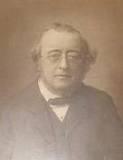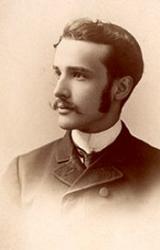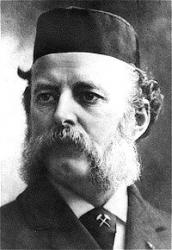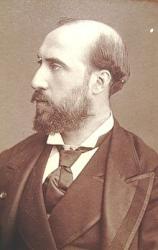Planning worship?
Check out our sister site, ZeteoSearch.org,
for 20+ additional resources related to your search.
- |
User Links
Person Results
‹ Return to hymnal




Export as CSV
Marion D. Savage
Person Name: Marion Dutton Savage Hymnal Number: 210 Author of "Teach us, O Lord, true brotherhood" in The School Hymnal
Marion D. Savage
G. W. Chadwick

1854 - 1931 Person Name: George W. Chadwick Hymnal Number: 45 Composer of "EATON" in The School Hymnal Educator, administrator, organist, conductor, and principal composer of the Second New England School, whose members also included John Knowles Paine, Horatio Parker, and Amy Marcy Beach, George W. Chadwick taught several generations of American musicians at the New England Conservatory, and came to be regarded as the standard bearer of the Yankee academic tradition in music.
Born in Lowell, MA. on November 13, 1854, Chadwick studied organ with his older brother and used his earnings as an organist to finance the musical studies which his father opposed. After leaving high school in 1872, he clerked for a brief time in his father's insurance office while studying with Dudley Buck and Eugene Thayer at the New England Conservatory. Upon graduation in 1876 he accepted an appointment as a music instructor at Mt. Olivet College in Michigan and founded the Music Teachers National Association. In 1877 Chadwick embarked on the pilgrimage which was considered de rigeur for American musicians; he sailed for Germany to study in Leipzig and Munich with such famous pedagogues as Rheinberger. His RIP VAN WINKLE OVERTURE, composed abroad to an American theme, won him some early notice, and before returning to the States in 1880, he tasted a bit of the bohemian life by tramping the Continent with a group of avant garde artists and writers called the Duvenek Boys.
New England Conservatory
From 1877 to his appointment to the Directorship of the New England Conservatory in 1897, Chadwick built his career as a Boston teacher, organist, and composer. Among his celebrated pupils were Horatio Parker, who, in turn taught Charles Ives, Daniel Gregory Mason, and Frederick Shepherd Converse. Chadwick's compositional style has been dubbed "Boston Classicism." Though there is a distinct academic foundation to his music, his works also reflect a certain Yankee bluntness and retain the hints of his colorful vagabond days. In his mature period to which his powerful verismo opera, THE PADRONE, and his lyric drama, JUDITH, belong, Chadwick's music makes significant strides in freeing the American idiom from the German conservatory style. Sensitive, also, to indigenous influences, Chadwick made use of African-American song, Anglo-American psalmody, and folk idioms in his symphonic compositions. His 137 songs for solo voice and piano reflect a deep-seated interest in contemporary poetry in a Romantic vein. Among his best known settings are two cycles by Boston poet Arlo Bates: A FLOWER CYCLE and TOLD IN THE GATE.
--www.pbs.org/wnet/ihas/composer/chadwick.html
G. W. Chadwick
Mary Butler
1841 - 1916 Hymnal Number: 136 Author of "Looking upward every day" in The School Hymnal Butler, Mary. The following hymns in Mrs. Brock's Children's Hymn Book 1881:—"Looking upward every day " (Onwards), and "O help me, Lord, this day to be" (Morning), are signed with this name. Beyond this we have no information.
--John Julian, Dictionary of Hymnology, Appendix, Part II (1907)
=====================
Butler, Mary, p. 1555, ii., is a granddaughter of Bp. Samuel Butler, of Lichfield, 1836-39; and daughter of Thomas Butler, M.A., sometime Rector of Langar, Notts, and Prebendary of Clifton in Lincoln Cath. “Whiteness of the winter's snow" (All from God), in The Council School Hymn Book 1905, is also by Miss Butler.
--John Julian, Dictionary of Hymnology, New Supplement (1907)
Mary Butler
Alfred R. Gaul

1837 - 1913 Hymnal Number: 285 Composer of "NO SHADOWS YONDER" in The School Hymnal
Alfred R. Gaul
Robert Prescott Stewart
1825 - 1894 Hymnal Number: 221 Composer of "MOUNT CALVARY" in The School Hymnal
Robert Prescott Stewart
Thomas Morley
1845 - 1891 Hymnal Number: 167 Composer of "SEELYE" in The School Hymnal Thomas Morley; b. Oxford, England, 1845; d. St. John, New Brunswick, 1891
Evangelical Lutheran Hymnal, 1908
Thomas Morley
Nathaniel S. Godfrey
1817 - 1883 Hymnal Number: 170 Composer of "ELLINGHAM" in The School Hymnal Born: November, 30, 1817, London, England.
Died: October 26, 1883, Southsea, Hampshire, England.
Son of an apothecary at Turvey, Bedfordshire, Godfrey was educated at St. Catharine’s College, Cambridge (summa cum laude, 1847). He served as Curate of Swansea (1847-48) and Biddenham, Bedford (1848-50). He resigned in 1858 to become minister and Perpetual Curate at St. Bartholomew’s Temperance Church in Portsea, Hampshire. While at Portsea, he was suspended for three years for practicing spiritualism.
--www.hymntime.com/tch/
Nathaniel S. Godfrey
Oliver Huckel

1864 - 1940 Hymnal Number: 140 Author of "O mind of God, broad as the sky" in The School Hymnal Born: January 11, 1864, Philadelphia, Pennsylvania.
Died: February 3, 1940, Orlando, Florida.
Buried: Second Congregational Church Cemetery, Greenwich, Connecticut.
An 1887 graduate of the University of Pennsylvania, Huckel was known as the class poet, and spoke at the university’s celebration of the birth of American president George Washington, and at the 1887 graduation ceremony. He went on to study at Harvard University and Andover Theological Seminary, Newton, Massachusetts, and in 1890 was ordained a Congregational minister, and received a Master of Arts degree from the University of Pennsylvania, and a Bachelor of Sacred Theology degree from Boston University.
He then pastored in Weymouth, Massachusetts, until 1894, when he went abroad to study at the University of Berlin and Oxford University. He returned to America in 1896, serving briefly in Amherst, Massachusetts, then moving to the Associate Congregational Church, Baltimore, Maryland, where he stayed the next two decades. In 1917, he moved to the Second Congregational Church in Greenwich, Connecticut, and retired in 1905. He also served as chaplain at Johns Hopkins University, Baltimore, Maryland;, Cornell University; and the University of Virginia.
--www.hymntime.org/tch
Oliver Huckel
Rossiter W. Raymond

1840 - 1918 Hymnal Number: 71 Author of "Star, star, beautiful star" in The School Hymnal Raymond, Rossiter Worthington, PH.D., was b. in Cincinnati, Ohio, April 27,1840. He graduated at Brooklyn Polytechnic, 1858, and also studied in Germany. He served in the Civil War of 1861-4 with the grade of Captain. Since then he has practised in New York as a consulting mining engineer. He was editor of the American Journal of Mining, and is a contributor to scientific literature. He has also written stories for children, a Paraphrase of Job, and some fugitive poetry. His hymns in common use include:—
1. Far out on the desolate billow. [God everywhere.] Written for the German tune, "Ich weiss nicht was soil es bedeuten," and published in The Plymouth Hymnal, 1894.
2. Morning red, Morning red. [Easter.] Written to the tune" Morgenroth," a German battle-song, and published in the American Book of Praise.
3. Now rest, ye pilgrim host. [Reviewing the Past.] This hymn is dated 1879, and was written for the 50th anniversary oi the Brooklyn Sunday School Union. It was included in The Plymouth Hymnal, 1891, No. 509, and, after revision by the author, in Sursum Corda, 1898, and other collections.
4. 0 Thou Who art inspiring. [Submission.] Appeared in The Plymouth Hymnal, 1894, No. 635, and later in other collections.
5. The God Who spann'd the heavens above. [Courage in Conflict.] "Written for my Sunday School, to be sung to the tune of the German patriotic song, ‘Der Gott, der Eisen wachsen liess' (by Arndt, p, 79, ii.), of which my first line is an evident and intentional imitation, though the remainder is not" (Author's MS.). It was published in The Book of Praise, the Sursum Corda, 1898, and others. It is sometimes attributed to "J. Clark,” but in error.
6. There dwelt in old Judaea. In Allon's Children's Worship, 1878.
Of the above Nos. 1, 2, 5 are in W. B. Bradbury's Clarion, 1867. Dr. Raymond is a Congregationalist, and is associated with the Plymouth Church, Brooklyn. [Rev. L. F. Benson, D.D.]
--John Julian, Dictionary of Hymnology, New Supplement (1907)
Rossiter W. Raymond


 My Starred Hymns
My Starred Hymns



